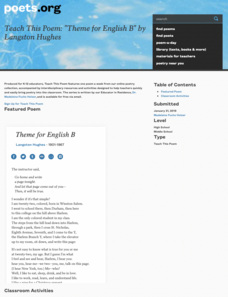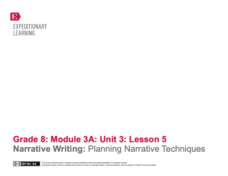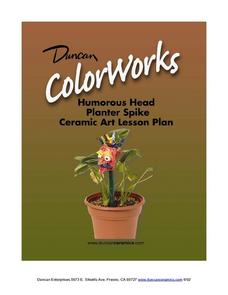Maryland Department of Education
The Concept of Diversity in World Literature Lesson 9: Debating Imperialism
To gain an understanding of Imperialism, class members read Rudyard Kipling's poem, "The White Man's Burden" and Mark Twain's essay, "To the Person Sitting in Darkness." Groups compare these perceptions of non-white cultures with the...
West Corporation
Making Inferences – Use Your Mind to Read!
How can you tell if someone is happy? The lesson works with elementary and middle school scholars to activate their schema and pay attention to details to make inferences in their daily lives, poetry, and other literature. Cleverly...
Federal Trade Commission
Ad Targeting and Techniques
What techniques do advertisers use to reach a target audience? Pupils discover the answer with the second of four Admongo lesson plans. Scholars learn about the most common strategies advertisers use to convince people to buy something....
Academy of American Poets
Teach This Poem: "Theme for English B" by Langston Hughes
Langston Hughes' "Theme for English B" is featured in a instructional activity that asks pupils to first read a biography of Hughes and list things about his life they think are important. The class then reads the poem and compares what...
Channel Islands Film
Island Rotation: Lesson Plan 1
How do scientists provide evidence to support the theories they put forth? What clues do they put together to create these theories? After watching West of the West's documentary Island Rotation class members engage in a series of...
Texas Center for Learning Disabilities
Fifth-Grade Text-Based Intervention
Look no further—here's a resource packed with focused intervention materials for special education teachers. A unique unit plan provides 10 days of structured text-based intervention strategies for fifth-grade learners. Each 30-minute...
EngageNY
Narrative Writing: Planning Narrative Techniques
It's all in the technique. Scholars revisit the model narrative they covered in lesson four to analyze the author's writing techniques. Readers compare techniques they spot in the narrative to those in the essay rubric. They then work to...
August House
The Magic Pot
The Magic Pot by Patricia Coombs is the theme of this multidisciplinary lesson plan. Early readers first take part in a read aloud and grand conversation about the story's details. Then, they get to work practicing their skills in...
Channel Islands Film
Cache: Lesson Plan 4 - Grades 4-5
After viewing the West of the West's documentary Cache, individuals craft either a newspaper article chronicling the discovery of the cache on San Nicolas Island, a historical narrative of the placement of the cache in the cliff side, or...
EngageNY
Grade 11 ELA Module 2: Unit 1, Lesson 21
Is there power in persuasion? After reading paragraphs six and seven of Booker T. Washington's "Atlanta Compromise" speech, learners look at how Washington uses rhetoric and carefully planned word choice to add to the persuasiveness of...
National Park Service
The Poet's Toolbox
If you need a lesson for your poetry unit, use two poems by Henry Wadsworth Longfellow ("Rain in Summer" and "The Slave in the Dismal Swamp") and a resource on Elements of Poetry. The lesson plan guides you through activities on...
Texas Center for Learning Disabilities
Second and Third Grade Explicit Phonics Intervention
Support all young learners on their journey to literacy with this five-lesson reading intervention unit. Following a clearly outlined format, each lesson first engages children in practicing their phonemic awareness and phonics skills...
Channel Islands Film
Cache: Lesson Plan 3 - Grades 4-5
Should the excavation of what is believed to be the cave of the Lone Woman of San Nicholas Island be allowed to continue? As a practice exercise designed to prepare pupils for a timed writing exam, individuals read two Los Angeles Times...
Curated OER
Horse Character: Ceramics Lesson
Animals oftentimes elicit various characteristics which make them symbolic or representative of human feeling, action, or emotion. The class creates horse characters out of clay to show character action and symbolism. This is a great...
Curated OER
Humourous Head Planter Spike: Ceramics Lesson
What a great activity. Kids create humorous ceramic character (heads) spikes to enliven a planter. Modern art is full of expressive and exaggerated forms and your class gets to create them out of clay. This would be a lovely activity to...
Curated OER
The Land Around Us - Lesson 3
While the content of this lesson is more specific to the first grade, the directions given to work on a PowerPoint are well written. These directions could be used by anyone, with any content. Younger learners may need help reading the...
Read Works
Lesson 4:Theme Matters
Determining a theme is one of the most difficult and most important standards in the Common Core. Use this plan to help your learners identify the message that an author is sending to the reader. The lesson is based around the book Dogs...
Curated OER
Genre Lesson: Poetry
Here is a terrific lesson on poetry! Learners bring in the lyrics to their favorite song. A class discussion ensues regarding what makes a song "catchy." After analyzing the alliteration of the poems, learners read the poem "This...
All for KIDZ
Building Relationships: The Orphan of Ellis Island
Family and friendship are two very important themes of the historical fiction novel The Orphan of Ellis Island by Elvira Woodruff. From video clips and writing prompts to reader's theater and family interviews, this resource provides...
Channel Islands Film
Once Upon a Time (Saxipak’a): Lesson Plan 4
How did the environment and natural resources found on the Channel islands influence the culture of the Chumash? Archaeology meets technology in an activity designed for middle schoolers. After viewing West of The West's documentary Once...
Channel Islands Film
Island Rotation: Lesson Plan 4
Foster's Rule? Allopatric speciation? After watching West of the West's documentary Island Rotation, class members use Venn diagrams to compare endemic species on the Channel Islands with mainland related species. They then create a...
Channel Islands Film
Island Rotation: Lesson Plan 2
Why are Torrey pines only found in La Jolla, California and on Santa Rosa Island? Class members examine images of Torrey pines from these two locations, noting the similarities and differences, and then develop a demonstration model that...
Minnesota Literacy Council
Grapes of Wrath and Pronouns
Many regard John Steinbeck's The Grapes of Wrath as the great American novel. The lesson plan combines a variety of strategies, including partner work, independent practice, creative writing, grammar instruction, and small group...
Southern Poverty Law Center
Evaluating Reliable Sources
A lesson plan instills the importance of locating reliable sources. Scholars are challenged to locate digital sources, analyze their reliability, search for any bias, and identify frequently found problems that make a source unusable.

























